HBO’s LGBT History: 1998, The Year in TV
 Wednesday, July 1, 2015 at 11:00AM
Wednesday, July 1, 2015 at 11:00AM
Manuel is working his way through all the LGBT-themed HBO productions...
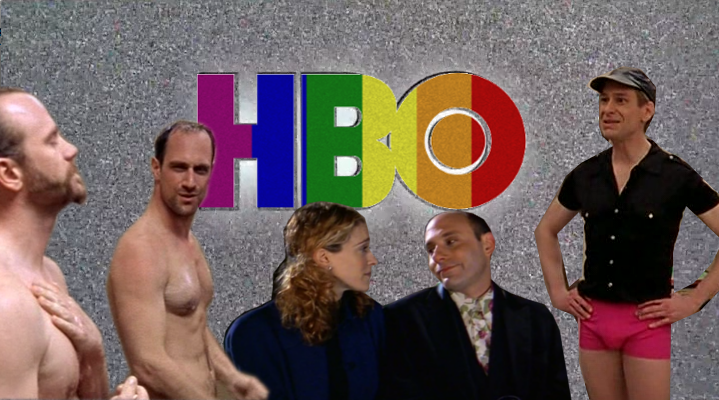
Last week we revisited one of Angelina Jolie’s best performances in Gia, the first HBO film to center on a female LGBT protagonist. Today we're focusing solely on TV in a pivotal year for HBO: 1998, a year before a certain mob guy would redefine a network and the TV landscape in general.
1998. What a year! The months apart premieres of Sex and the City and Will & Grace could easily cement it as one of the gayest years in recent memory, but that would tell only part of the story. The year after Ellen’s “The Puppy Episode,” gays were, seemingly, “going mainstream.” Yes, the troubled production and distribution of 54 showed there was still hesitancy over telling openly queer stories in Hollywood (especially those that stepped outside known gay narratives), but films like The Object of my Affection, High Art, Gods and Monsters, Wild Things, Velvet Goldmine (Gia even!) would continue to pave the way for Hollywood’s embrace of an exploration of gay suburban desperation in Sam Mendes and Allan Ball’s American Beauty the following year.
And on TV? Well, HBO offers us a great cross-section of how networks were diversifying its stories to include more (if not broader) LGBT representation.
Oz, Sex & The City and more after the jump...
Tracey Takes On… “...Marriage.” (January 4 1998)
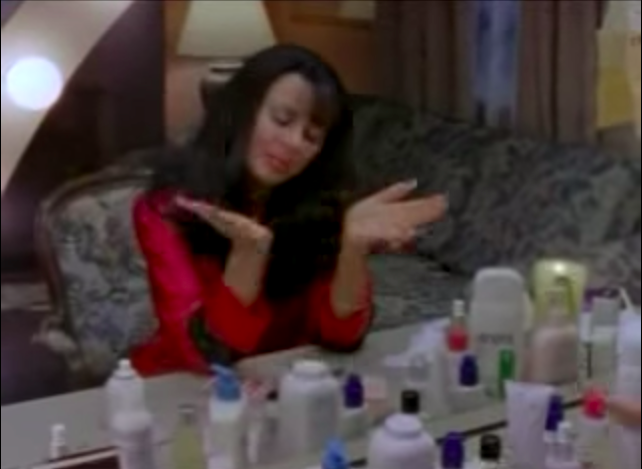
“He discovered in our honeymoon that he was a latent homosexual and by the time we got back to LA he was beyond latent and got arrested for performing oral sex on a baggage handler in Burbank airport.”
HBO’s year began with the premiere of the third season of Tracey Ullman’s sketch show with an episode centered on marriage. Linda’s “latent homosexual” ex-husband joke is indicative of the way gay humor had gone mainstream, especially when framed in terms of marriage; Kevin Kline’s 1997’s In & Out and Robin Williams’ 1996’s The Birdcage had done great business, while Susan and Carol’s marriage on Friends in “The One With the Lesbian Wedding” in 1996 had proven that there was a market for comedy that mined same-sex marriage relationships. Progress, yes, but one still tethered to known (heterosexual) institutionalized visions of intimacy.
The Larry Sanders Show, “Putting the ‘Gay’ Back in Litigation” (17 May 1998)
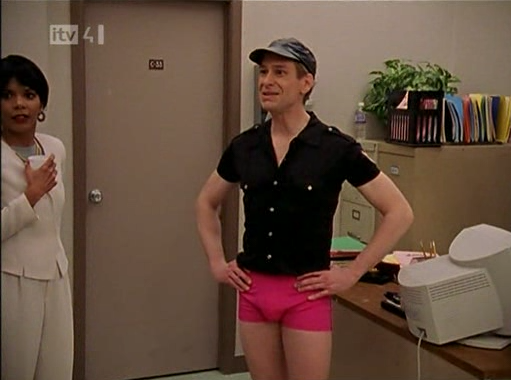
“What, did you get that at the Freddy Mercury estate sale?”
The “gay episode” had, by 1998 been a staple of television for almost three decades. We seldom talk about it, but All in the Family showed America its first openly gay character back in 1971 and the strategies that episode utilized (using a guest spot to teach audiences about LGBT people) continued to be the way sitcoms in particular addressed LGBT issues. The Simpsons had just aired its own very special gay episode (“Homer’s Phobia” featuring John Waters himself!) and That 70s Show would do so again at the end of 1998 (featuring a very game Joseph Gordon-Levitt!) but trust HBO to already move beyond such trappings. Scott Thompson, known for Kids in the Hall, played Brian, the gay assistant in Larry Sanders’ meta late-night comedy. In its penultimate episode, the show hilariously takes on workplace harassment when Brian, fed up with Phil’s homophobically-tinged jokes at his expense, sues the show for sexual harassment. Of course, the pointed critique of latent homophobia that laces much of late night comedy is blunted by the show’s tidy resolution (a drunken Phil is shown making out with Brian while a character quips “Looks like they settled out of court”).
Sex and the City, “The Turtle and the Hare” (2 August 1998)
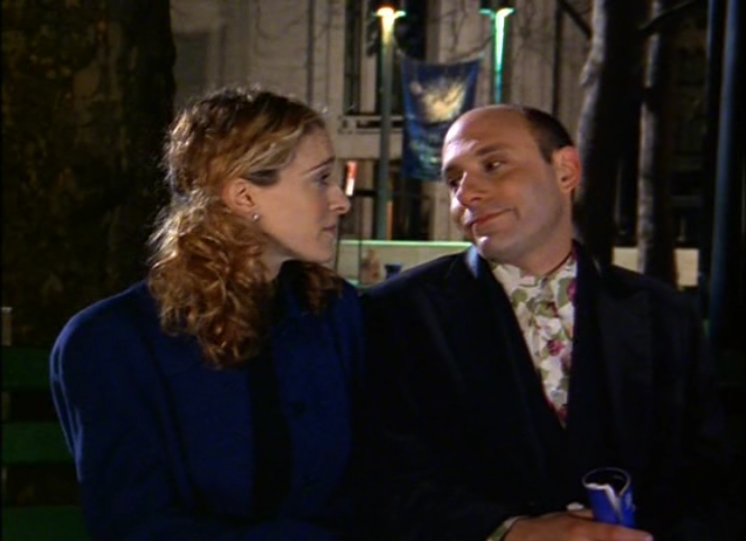
"Even guys like me don't want guys like me."
I can’t even begin to describe what a pivotal moment Sex and the City’s premiere was for both HBO as a network and for the gay community since. Will & Grace may have established itself as the banner network show for LGBT representation in the late 90s and early 00s, but Sex and the City’s cable home (and its early seasons’ decision to tackle taboo subjects that HBO had only ever dealt with in its Real Sex show) locate it still as, yes, a commodified and glittery fantasia of a show, but one which nevertheless opened doors when it came to addressing LGBT characters. Yes, later seasons (and movies; and we’ll get to those eventually) sanded off its rougher edges, but that first season is a diamond in the rough. There’s the episode where Miranda gets set up with a woman (a fascinating indictment of femininity and heterosexuality doubly ironic given Cynthia Nixon’s since outspoken role in the community) but it is “The Turtle and the Hare” which showed the potential for complicating the role of the “gay best friend.” We might cringe at his seemingly stereotypical depiction, but the show’s insistence on examining his inner life (his frustrations with dating, his anxiety over coming out to his grandmother) cannot be taken lightly.
Oz, “Strange Bedfellows” (17 August 1998)
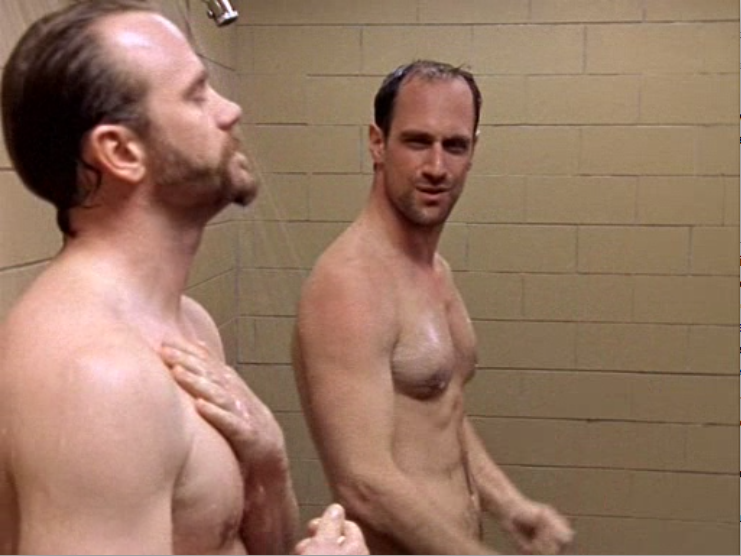
“Two men shouldn’t love each other. They can’t feel the same things a man and a woman feel. I mean, if a guy has a lot of bad shit happen to him and another guy comforts him, that’s all it is; that’s not love, right?” - Beecher
And then there’s Oz and “Strange Bedfellows” which would be a pivotal moment for one of the most enduring same-sex couples in HBO history, Beecher (Lee Tergesen) and Keller (Chris Meloni). This is the episode where these cellmates finally kiss after the former finally professes his love to a drunken Keller. The entire episode (which also features a graphic rape scene) homes in on the tender and almost domestic relationship these two characters have developed. The passionate kiss that follows (which means decidedly different things for each man. Keller is, we know, motivated by a vengeance plot against Beecher on behalf of Schlinger, an as yet Oscarless J.K. Simmons. Of course the rest of the series would find Beecher and Keller endlessly renegotiating their feeling for one another even to its climactic finale (which I won’t spoil of course but which is deliciously Shakespearean). The frank depiction of sex and male bodies (there’s a particular pan of Meloni’s sleeping body that is surprisingly erotic in its simplicity) in Oz was one of the things that made the show in particular (and HBO in general) a breakthrough in cable television; it showed characters wrestling with same-sex attraction and masculinity in increasingly revelatory ways.
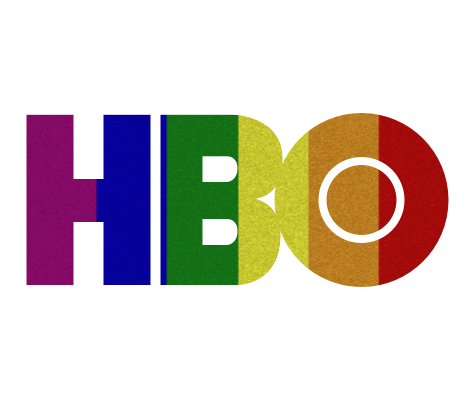
Fun Awards Fact: The year after “The Puppy Episode” won an Emmy for Ellen and her writing team, Outstanding Writing for a Comedy Series in 1998 was a very gay affair. Not only was Larry Sanders’ “Putting the ‘Gay’ Back in Litigation” nominated (it lost to the show’s season finale, “Flip”) but two other episodes nominated featured a gay storyline: Ellen’s episode “Emma” with the radiant Emma Thompson playing a version of herself who is not only hiding a secret about her sexuality but also about her nationality (“I am going to tell the world that I’m gay! And a Yank! A gay Yank!”) and Frasier’s “The Ski Lodge” episode where, in true comedy-of-errors style, Daphne pines for a male ski instructor who’s taken with Niles (Frasier: “All the lust coursing through this lodge tonight, all the hormones virtually ricocheting off the walls, and no one... was chasing me?”)
Next week: We return to our regular programming by looking at If These Walls Could Talk 2 (another anthology entry, this time all about lesbians) which features a very TFE-friendly cast, including Vanessa Redgrave, Marian Seldes, Michelle Williams, Chloe Sevigny, Sharon Stone and Ellen DeGeneres.
 HBO,
HBO,  HBO LGBT,
HBO LGBT,  LGBT,
LGBT,  Larry Sanders,
Larry Sanders,  Oz,
Oz,  Sex and the City,
Sex and the City,  Tracey Ullman
Tracey Ullman 


Reader Comments (18)
I remember being in love with Chris Meloni when I was young and in the closet. Keller was crazy, but damn, was he hot.
I have seen every single episode you mentioned at some point in my life. The Ski Lodge is one of my favorite Frasier episodes. I watched the HBO episodes right when they aired. I was quite young at the time, and Oz was like nothing I had ever seen before. I instantly fell in love with Stanford's grandmother.
I have a love-hate relationship with Will and Grace. It was the first show I watched from the very first day it premiered to the series finale instead of catching up via reruns. Has any show with such a promising start and excellent first few seasons gone downhill simply because the writers refused to get over a marginal character (Leo)?
Beecher and Keller endlessly renegotiating their feeling for one another even to its climactic finale (which I won’t spoil of course but which is deliciously Shakespearean).
I'd say violently painful.
A great round-up, including some characters (like Scott Thompson's), that I didn't know about.
I'm curious to know more about why you see Sex in The City as "pivotal...for both HBO as a network" (I won't argue that) "and for the gay community since" (which seems like a really large claim). I don't necessarily see the show as "pivotal" for the "community." And I say that as someone who went almost weekly to SITC viewing parties! What do you mean?
3rtful: "Violently painful" and "Shakespearean" are pretty much on par, no? The Bard loved himself some violent deaths, especially those that end up giving the characters and audience a middle finger.
San FranCinema: I just mean it terms of reviving a type of gay identification that hadn't been seen since Golden Girls. Plus, giving us Cynthia Nixon as a crusader for the community, SJP as a fashion icon, and bringing into the world the idea that "I'm a Samantha" was a shameless self-label, was pretty revolutionary for a community that sometimes feels more at home embracing shows that exhibit a gay sensibility than those that represent gay experience. Maybe "pivotal" is a bit of an embellishment, but SatC is as gay and as media-landscape changing as they come.
...All in the Family showed America its first openly gay character back in 1971 and the strategies that episode utilized (using a guest spot to teach audiences about LGBT people)...
And the guest star was the super-butch (of course) Phil Carey, known to older audiences as a studly Hollywood character actor and to post-All in the Family generations as Dallas-styled cowboy patriarch Asa Buchanan on One Life to Live.
Ah, Chris Keller. One of my favorite TV characters of all time. An episode would instantly drop in quality for me if i didn't see Meloni's name in the opening credits. What a fearless performance! I mean it takes alot to flash your hole to the camera and be filmed pissing in a bucket or putting your hand in someone's boxers to feel their dick but he went there.
Plus, he had MADDDD chemistry with Beecher/Tergesen. They were an **extremely** toxic couple but I rooted for them like crazy.
Manuel -- i agree that Sex & The City was seismic in a way that few shows are. Sadly people like to denigrate it's cultural potency... probably because it's female-based. Yes yes Sopranos was a major major iconic show but it did not create HBO as we know it from whole cloth. That took the combined powers of Six Feet Under and Sex & The City and The Sopranos.
I have only seen like 4 episodes of Oz because i just couldn't handle the violence so I never really got the fervor for the Beecher & Keller pairing since I missed almost all of it. But I wish I could just watch that part ;) Or at least only edited parts so i dont have to watch anybody killing each other
I didn't know about this characters from the Larry Sanders show but i LOVE-LOVE-LOVED Scott Thompson on Kids in The Hall.
Nat, it's (almost) all on YouTube, just the Belcher-Keller "romance," in various languages even.
I will always love Lee Tergesen because of his work in this show. The couple of times I've been in his presence I was speechless, and that never happens to me.
Good god, that picture of OZ.
*melting*
"Nat, it's (almost) all on YouTube, just the Belcher-Keller "romance," in various languages even."
I totally watched all of the parts of this about a year ago when I felt like revisiting the series to see Beecher and Keller but didn't want to make the time commitment.
https://www.youtube.com/watch?v=OMRrsQolsOI
I always feel like Oz never gets the credit/attention it deserves for how groudbreaking it was in it'sdiscussion of masculinity, sexuality and gender.
Ps: Haven't been commenting but I'm loving this series on hbo lgbt history. Interesting choice of object and great analysis on lgbt representation.
Oz fan here. Galvanic show with a great cast. Needs to be vindicated more often.
"OZ" was gay porn for straight men- let's have sex but then I have to kill you'
"Tracey Takes On" that year also had its lesbian character thrown into a homosexual deprogramming center. Tracey played three characters in the sketch. It was the "Religion" episode and it won a GLAAD award. Scott Thompson was also in it. BTW, the "Marriage" episode had her male cab driver character talking about same-sex marriage.
I remember everyone was obsessed with Leo in 1998 after the gargantuan release of Titanic in late 1997. At the time, I was about to enter high school and was exploring the Internet and learned about this movie Leo did called Total Eclipse where he and David Thewlis had a gay relationship. It was so underground and then I was lucky enough to find it late on night on some cable channel. I was 14 and seeing a movie about a gay relationship with a big movie star. 1998 really was the year that set off the trend that it was OK to be gay in movies. 1999 had gay love depicted in American Beauty, Boys Don't Cry, Election, Being John Malkovich, and more. Great time to grow up.
I'm loving this series of articles. I agree about the cultural importance of "Sex and the City." Whereas "Will & Grace" will likely only be talked about in terms of its time capsule cultural impact (it's unwatchable now), I can still watch "Sex and the City" and enjoy it as a show.
I used to watch "Oz" probably more than I should have as a pre-teen. It's inextricably linked to (sigh) "Queer as Folk" in my mind because they were both broadcast on the same Canadian Channel and it was, pre-widespread internet, my only chance to see male nudity as a budding young gay. Good times.
Thanks everyone for the kind words; glad to hear you've been enjoying reading about my journey through these films and shows!
Bill, I knew about the cab driver (but couldn't find the clip so ended up omitting any mention though now I'm curious about that Religion ep!) Oh that they were easier to find/stream/watch!
I will shamelessly admit that I just wanted to include that Oz because WOOF! but really, the more I read and researched about it, makes me feel like i should one day sit down and watch all of it. Yes, even the gory violent bits.